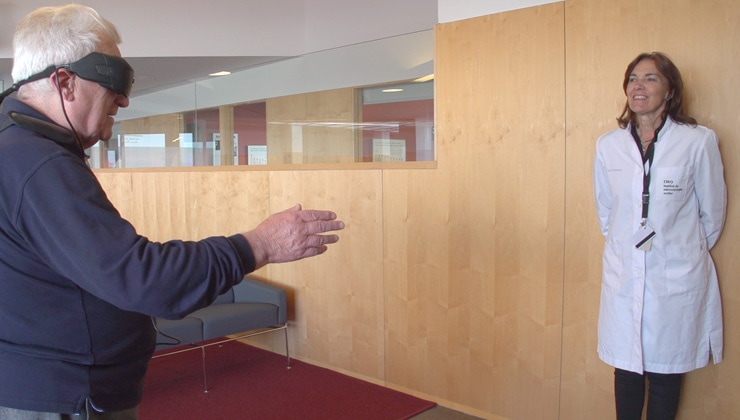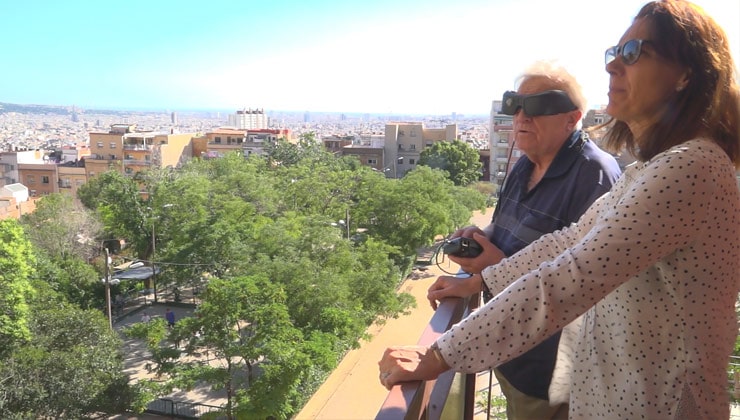Francisco Mulet
13 de April de 2022
Artificial vision is a reality that is getting closer thanks to the contribution of patients like Francisco, who is testing the new device developed by Pixium Vision within the framework of a European clinical trial involving the IMO as the only centre in Spain.
Francisco Mulet, who has been blind for more than 30 years owing to retinitis pigmentosa, is one of the ten patients participating in a European clinical trial to test the efficiency of the IRIS®II retinal chip, thus becoming the first recipient in Spain of this new artificial vision system developed by the company Pixium Vision. Despite the commitment involved in participating in a study of this nature, with weekly work sessions and a follow-up period of at least 18 months, he did not hesitate to join the project to contribute to scientific progress as a patient. His motivation when making this decision was not only to experience some improvement, but, above all, to leave a legacy and for future generations – perhaps his grandchildren, if they suffer from the pathology – to be able to fight vision loss caused by hereditary retinal dystrophies.
To this end, in January 2017, Francisco underwent surgery to implant the device, which was performed by Dr Borja Corcóstegui during three and a half hours and occurred without complications, as it was performed with utmost rigour and precision. One month after surgery, when activating the 150 electrodes that make up the IRIS®II device, he already perceived the first points of light, which he describes as “sparks”, “flashes” and even “diamonds”. The first impact was very positive and satisfactory for him, as he went from seeing absolutely nothing to managing to capture these flashes in the midst of darkness. A dream that compensated for the many hours devoted to individually adjusting the power of each electrode, in order to achieve a perfect alignment of the device and the patient.
Learning to “see” again
But his work did not end there: in order to take full advantage of the benefits of this sophisticated and promising technology, Francisco soon enrolled in an intense visual rehabilitation programme to learn how to interpret light signals and “see” with the help of the chip, that is to say, to “see” in a completely different way to how he used to before and to how people are used to see. The change is not easy and requires a lot of will, commitment, patience and dedication to train this new mode of vision (or, better, modes of vision, as the system includes up to 4 different ones). Along this process, he is being accompanied by the low vision optometrist Carol Camino, with whom he performs exercises to scan with the eyes, locate objects and, subsequently, identify them according to their shape and size, with different types of contrast and movement.
Linking the lights to what they actually represent is his present challenge, in which task he is evolving at a very good pace, according to experts, although he would like to progress even faster: when it comes to seeing, you always want more. At the age of 75, Francisco Mulet explains that he feels like a child with a new, highly valuable toy in his hands, which he is gradually adapting to with the help of his family and a team of IMO and Pixium Vision professionals, who ensure that they are involved in research and their patient. This collaboration, which has turned into a relationship of complicity, is key to overcoming stages of a pioneering journey, in which many expectations are to be answered and many uncertainties unveiled, something that is only possible when experimenting.

Rehabilitation session at the Institute.
In everyday life
Trying things, making mistakes and trying again: this is how the IRIS®II bionic prosthesis study advances, throughout which Francisco has reached small milestones on a daily basis. He has progressed continually and, after starting the visual rehabilitation sessions at the Institute in March (which he is still pursuing), he has got at home since May the customised glasses that are part of the system, to gradually integrate the latter into his daily life. The complexity of the “real world” has come to the fore, where not everything is convenient or occurs under optimal conditions for visually impaired people, which made Francisco not back out, who takes advantage of his free time to become familiar with the device.
This persistence has led him to accept a new challenge, which he met in June: leaving the familiar environment on an evening stroll along the iconic Montjuïc Magic Fountain, where he had not been for a while and with which he capped his first half year after being implanted the IRIS®II. In front of the fountains, while trying to differentiate the water flowing up and down, Francisco sighted not only the path he had covered, but also the one he still had to walk. And with the positive balance achieved to date, he gathered the strength to continue taking steps forward in the coming months, while being aware of the fact that this is only the beginning of the road to artificial vision.

Training at home with the bionic prosthesis.
IMO Institute of Ocular Microsurgery
Josep María Lladó, 3
08035 Barcelona
Phone: (+34) 934 000 700
E-mail: international@imo.es
See map on Google Maps
By car
GPS navigator coordinates:
41º 24’ 38” N – 02º 07’ 29” E
Exit 7 of the Ronda de Dalt (mountain side). The clinic has a car park with more than 200 parking spaces.
By bus
Autobus H2: Rotonda de Bellesguard, parada 1540
Autobus 196: Josep Maria Lladó-Bellesguard, parada 3191
Autobuses H2, 123, 196: Ronda de Dalt – Bellesguard, parada 0071
How to arrive at IMO from:
IMO Madrid
C/ Valle de Pinares Llanos, 3
28035 Madrid
Phone: (+34) 910 783 783
See map in Google Maps
Public transport
Metro Lacoma (líne 7)
Autobuses:
- Lines 49 & 64, stop “Senda del Infante”
- Line N21, stop “Metro Lacoma”
Timetables
Patient care:
Monday to Friday, 8 a.m. to 9 p.m.
IMO Andorra
Av. de les Nacions Unides, 17
AD700 Escaldes-Engordany, Andorra
Phone: (+376) 688 55 44
See map in Google Maps
IMO Manresa
C/ Carrasco i Formiguera, 33 (Baixos)
08242 – Manresa
Tel: (+34) 938 749 160
See map in Google Maps
Public transport
FGC. Line R5 & R50 direction Manresa. Station/Stop: Baixador de Manresa
Timetables
Monday to Friday, 09:00 A.M – 07:00 PM




